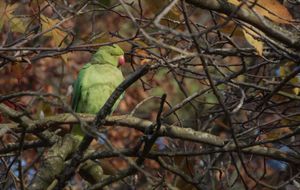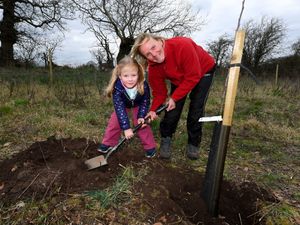Image shows latest parakeet sighting as numbers continue to rise across Black Country
Reports of wild parakeet sightings have been flying in as experts warn that the species could become more common than ever before.

It comes after Stourbridge resident Bridget Hand captured an amazing photo of one of the birds at Mary Stevens Park.
The increased sightings have split the opinions of bird lovers and experts alike, who both call for the non-native species to be more closely watched as they begin to spread.
The wild ring-necked parakeets have become a more common sighting around the West Midlands in the last few years as the birds exponentially breed in the area.
Matt Kirby, owner of Oak Ecology, an ecological survey provider, said: "These birds can be quite territorial and can also be combative with other species over food sources.
"They tend to nest between March and September, but are also known to nest at other times of the year if the weather is right."
The opportunistic birds are known to lay between two to four eggs per nest but can occupy multiple nests if conditions are correct.
Wild parakeets have been spotted in several Black Country green areas as they fight for space.
Mr Kirby continued: "Parakeets are opportunists, so they will take any chance to hold a nest that they can, they are lovely birds to see around, but can be invasive.
"It takes around 40 to 50 days from hatching to fledgling, so a rough estimate is around two months from laying an egg to leaving the nest, which could mean that we will see a lot more of these birds in the next year or so."
Mary Sandhurst, a birdwatcher from Bloxwich, noticed more common sightings of the birds over the last few years, saying it is common to see them competing for food with other birds.
Ms Sandhurst, 55, said: "I commonly see them in back gardens contending with other birds over food now. They are wonderful creatures to look at and they aren't the least bit shy.
"I think they should be more closely watched as they continue to nest, they aren't a native species, so I think there should be a certain level of care to safeguard our natural birds and to make sure they have a fighting chance."






